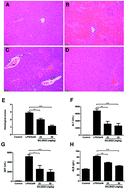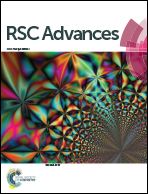SKLB023 protects mice against acute liver injury by inhibiting proinflammatory cytokine production in both T cells and macrophages†
Abstract
Acute liver failure is a severe clinical syndrome accompanied with excessive inflammatory response. Our previous study demonstrated that SKLB023, a novel thiazolidinedione derivative, showed potent anti-inflammatory activity in rheumatoid arthritis. The purpose of the present study is to evaluate the protective effect of SKLB023 on lipopolysaccharide (LPS)/D-GalN-induced liver failure and to explore the underlying molecular mechanisms. Our results showed that SKLB023 significantly improved mortality and liver injury as indicated by reduced serum levels of aminotransferases and alleviated pathological damage. Additionally, SKLB023 decreased the percentage of activated T cells and macrophages as well as the serum levels of cytokines in vivo. Furthermore, SKLB023 decreased levels of TNF-α and IL-6 secreted from liver macrophages (Kupffer cells) stimulated by LPS in vitro. Our results indicated that the protective effects of SKLB023 were associated with its significant impact on the inflammatory cytokines, which were produced by both T cells and macrophages.



 Please wait while we load your content...
Please wait while we load your content...